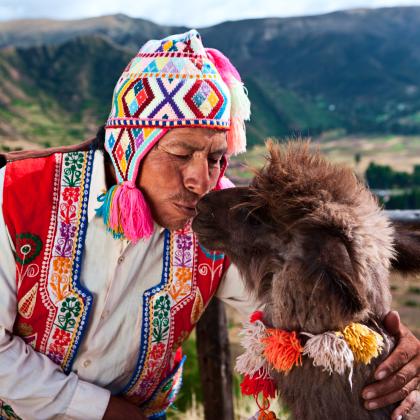Do you want to support our efforts to create a better world?
Small steps lead to a big change and all contributions are valuable.
The cattle sector plays both positive and negative roles in agriculture. On one hand, it is a leading cause of environmental harm, contributing greatly to deforestation and climate change. On the other hand, cattle are vital for food security and economic stability, especially in regions with limited nutrients or economic opportunities. Proper management and limitations on herd size can result in net-positive environmental outcomes, including enhanced biodiversity and soil health. Therefore, focused efforts within this industry are essential to promote a shift towards more sustainable practices that effectively address climate change, protect the environment, and enhance the well-being of both people and animals.
The cattle sector faces critical challenges. While the livestock sector supports livelihoods and nutrition security for almost 1.3. billion people, it also undermines sustainability in many ways. Among all agricultural commodities and livestock species, the cattle sector poses the most significant sustainability challenges. Both supply and demand side issues, exacerbated by increasing global demand, need to be addressed. This underscores the importance of adopting sustainable management practices to balance environmental conservation with food security and economic growth.
The EU finally reached an agreement today on a new historic law to prevent companies from selling commodities linked with deforestation and forest degradation around the world on the EU market. The new EU Deforestation Regulation (EUDR) sets ambitious rules to halt global deforestation and forest degradation through innovative and co...
Read moreCreating sustainable impact is at the heart of our mission.
890,000+
farmers, workers and land managers are assured that their well-being, human rights and cultural heritage are protected.
36.7+ million
hectares of land where nature and environment are protected from degradation and conversion through use of sustainability standards.
32,000+
tonnes of CO2 emissions have been reduced, thus lowering the climate impact.
Biomass is essential for sustainable development, reducing carbon emissions, and providing renewable energy. Its growing utilisation highlights its importance in combating climate change and promoting sustainable practices across various industries.
Learn moreWhile vital for food security, cattle also contribute to deforestation and climate change. Focused efforts are needed to promote sustainable practices that enhance biodiversity, soil health and the well-being of people and animals.
Learn moreAddressing climate change is urgent for sustainable development. Reducing greenhouse gas emissions emissions through innovative strategies is essential to mitigate its impact.
Learn moreCocoa farming impacts the environment, economy and climate globally. Sustainable practices such as agroforestry can mitigate its negative effects, making cocoa relevant for climate change mitigation.
Learn moreBalancing economic sustainability with responsible production practices is crucial in the coffee industry. Adapting to climate change while meeting rising global demand is essential for sustainable coffee production.
Learn moreRevitalising ecosystems is crucial for our planet’s health and preservation. Combating deforestation and degradation with sustainable practices ensures long-term recovery.
Learn morePalm oil production supports economies but raises environmental and social concerns. Sustainable practices are crucial to address issues such as deforestation and labour rights.
Learn moreRice production significantly impacts climate and nature. Addressing emissions, water usage and deforestation in rice farming can lead to positive environmental changes.
Learn moreNatural rubber is essential for industries but contributes to deforestation and biodiversity loss. Addressing sustainability concerns such as poor working conditions is crucial in rubber production.
Learn moreSoy plays a vital role in global food security and biofuel production. Emphasising sustainable growth is essential to address environmental challenges in soy farming.
Learn moreTimber's global impacts on people, nature and climate require sustainable management. Forests are essential for biodiversity as well as soil and water conservation.
Learn moreThe travel industry's sustainability intersects with environmental conservation and cultural preservation. Responsible consumption and support for local communities are crucial for sustainable travel.
Learn moreOur mission extends beyond these focus areas to any crop or product with potential for sustainable impact. We support conservation and ecosystem restoration projects worldwide and help businesses adapt to changing regulations.
Learn more
Small steps lead to a big change and all contributions are valuable.